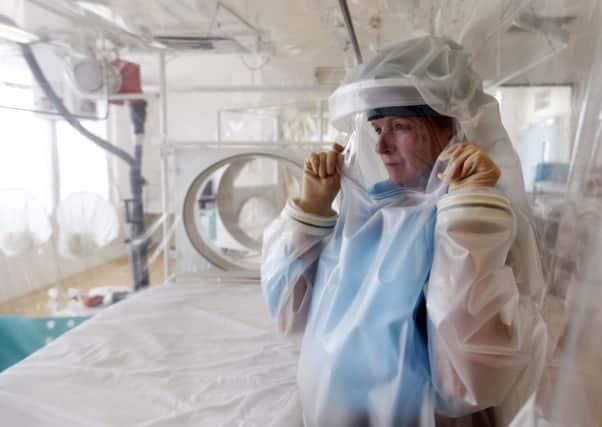Leaders: Why West must do all it can in Ebola fight


Yesterday, the US and UK governments stressed that a major outbreak in the West was unlikely. But such assurance is of scant comfort when medical staff and government agencies are faced with the practical difficulties of containment, and when descriptions of Ebola are as vague as “flu-like” – this with the actual flu season fast approaching. In a video conference call with David Cameron and the leaders of Germany, France and Italy, the US president said the international community “needed to do much more and faster to halt the rise of the disease”.
It is tempting to take comfort in the West’s advanced healthcare systems and to assume that the risk of a major outbreak outside of the front-line African countries is remote. This is unwise on two counts.
Advertisement
Hide AdAdvertisement
Hide AdFirst, the experience of Dallas Presbyterian Hospital in Texas illustrates how vulnerable we are to human error. From one Liberian who died, two nurses who were caring for him have contracted the disease. Nearly 80 health workers are now under observation. Claims by the nursing union range over lack of appropriate protective clothing, exposure of flesh and lack of clear guidelines of what to wear, how to wear it and how to disrobe.
Second, the rapid spread of the disease in West Africa should be counter enough against complacency. Given the incidence of international travel, this is by no means only an African problem, but a global one. And because of that, we have a responsibility to do our utmost to help in Africa for reasons that include – but should by no means be limited to – self-interest and self-preservation.
According to the World Health Organisation, the virus has killed about 4,500 people so far, with nearly all of the deaths in Liberia, Guinea and Sierra Leone. But even this figure may be a serious under-estimate. Based on small trials, agencies including the WHO and the US Centres for Disease Control are taking an “educated guess” that the figure is about twice that.
As to the likelihood of death from contracting the virus, the “best estimate” of scientists at Imperial College London is a 60-70 per cent case fatality. On this basis, about 12,000 are either dead or dying.
Against this worrying backcloth, the arrival of 91 UK medical staff from Aldershot to run a treatment centre in Sierra Leone is an encouraging development. It shows that we are acting and not just standing on the sidelines.
Given the unfolding scale of the disaster, this should be seen as the first wave of a concerted tide of western support. This is a crisis for all of us.
Better not botch togetherness
From Mark Durkan, a former deputy first minister of Northern Ireland, comes a sobering warning for politicians here seeking to push through “more powers” legislation. The enacting of the peace process – the last major change to the UK constitution – was rushed, resulting in years of political “stalling” that followed the Good Friday Agreement. The same, he said, could befall attempts to achieve more powers for the Scottish Parliament by seeking to pursue an unrealistic timetable.
Advertisement
Hide AdAdvertisement
Hide AdAs yet, Lord Smith’s commission, having already attracted an astonishing 4,000 submissions, is barely on the southern slopes of consultations to reaching a cross-party consensus by the end of next month on what precisely the “more powers” legislation will comprise. Then there is the formidable problem of steering legislation through the House of Commons.
The complex mechanics of translating the independence referendum campaign’s “more powers” slogan into clear, robust and effective legislation are becoming more stark with every week. MPs heard warnings yesterday from leading academics Michael Keating of Aberdeen University and Nicola McEwen of Edinburgh University that any agreement could make Scotland’s settlement worse. Certainly the tight timetables dictated by “The Vow” and the timing of the pending UK general election do not suggest a thoughtful period of due reflection and examination.
The danger is surely less that the ambitious timetables will slip than that rushed legislation will result in faulty legislation requiring re-visitation within a few years. For such a major constitutional change, we need something better than a botched job.